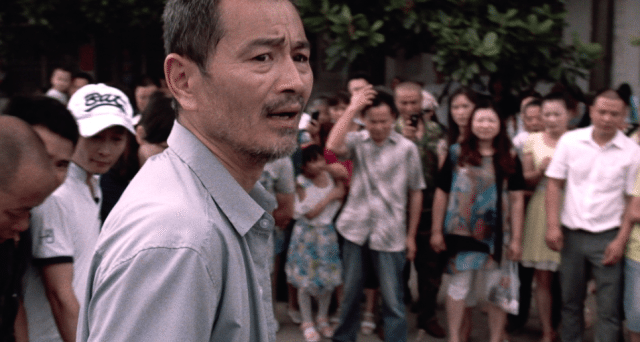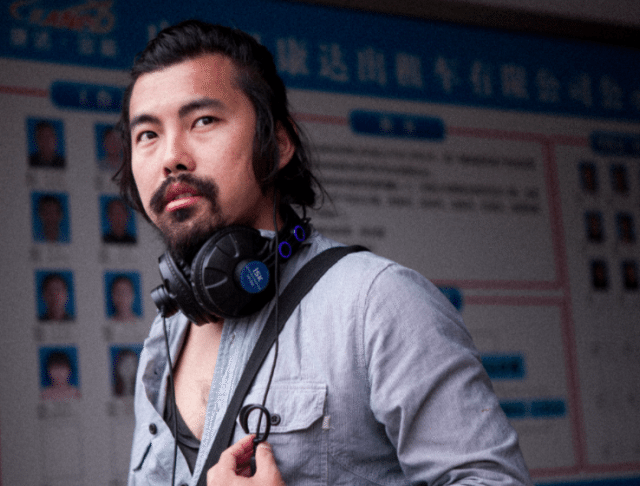
 I spoke to director Johnny Ma about his film Old Stone the morning after the US election. Given that his film is a social thriller about a small town cab driver (Chen Gang) who is screwed by a bureaucratic system when he tries to help someone in need, didn’t make the interview an easier pill to swallow. But speaking to Ma it was clearer than ever that art would play a part of utmost important in transporting our fears, concerns and ideals onto a platform which could be consumed by people from all walks of life. Even though Old Stone is his debut feature, Ma shows the precision of someone who’s been doing this forever. As the film opens in New York City, we spoke about how he found his leading man, injecting genre elements into social dramas, and how the screenplay he wrote at first, eerily resembled the world we suddenly found ourselves in the day we sat down to talk.
I spoke to director Johnny Ma about his film Old Stone the morning after the US election. Given that his film is a social thriller about a small town cab driver (Chen Gang) who is screwed by a bureaucratic system when he tries to help someone in need, didn’t make the interview an easier pill to swallow. But speaking to Ma it was clearer than ever that art would play a part of utmost important in transporting our fears, concerns and ideals onto a platform which could be consumed by people from all walks of life. Even though Old Stone is his debut feature, Ma shows the precision of someone who’s been doing this forever. As the film opens in New York City, we spoke about how he found his leading man, injecting genre elements into social dramas, and how the screenplay he wrote at first, eerily resembled the world we suddenly found ourselves in the day we sat down to talk.
This film seems more timely than ever. Why did you want to tell this story?
It’s funny you say this, because the original screenplay was set in Detroit and was written for Michael Shannon, so it was a Trump-ian world, the remnants of what a social system is. If it was set in America it would be more racially charged as well. I remember describing that world and thinking it was a dystopia, and now it seems it might become a reality which is so sad. The inspiration for the story came from an article about a truck driver who hit a person in the mountains, he got out of the truck and realized he was still alive, so since the guy wasn’t dead he decided to run him over again. When the police interrogated him he explained he did what he did because it would’ve been worse if the guy had been alive it would’ve been worse. I totally understood what he meant, I might’ve done the same thing so this was so scary, I saw myself becoming this self-interested person. I wanted to make a film about a good person who perhaps doesn’t even exist in this world anymore.
I think this empathy does come across in the film. When the film starts and we see Lao Shi he seems pretty creepy, but then we realize how he got there and it makes us change our mind.
When I first wrote the film people asked if this character still existed, I wanted to see what people in traditional China thought of as a good person. I wrote Old Stone based on what Confucius thought, I was worried this person wouldn’t feel real in our world, but the point of the story was actually that we would always judge him, I wanted people to get frustrated at him and wonder why he makes the choices he makes. I tried to make the ending as bloody as possible, to contrast with the very real world in which the film begins. The only wrong thing this guy does is trying to help somebody, my hope is the audience will watch this film and feel a reversal in how they see someone empathetic and we are the ones hoping he won’t do that.
Genre films tend to be quite eye opening, do you have specific instances of genre films showing you new aspects of the world?
I tried to put my film into two or three films, I hope my film will find its place somewhere in the middle. The anger is from A Touch of Sin, I remember how real that film was but it’s also so stylized, there’s two incidents that take the norm of the reality and puts them in a different place. In one scene this guy shoots a woman and she flies across the room, I remember the audience laughing because it was so unreal, but also so brutal. I think there is something to be gained from fusing genres and playing with expectations. When you set something in the real world people think it’s about issues but once you add the thriller elements people think about escapism.
I read you cast someone in a short film because you liked their hair…
Yes.
...what were the traits you were looking for when you cast this film?
I’ve only worked with non-professional actors, I try to merge my story with their own life and I feel we all learn from the process. There’s a journey in the film parallel to the actor’s story, that’s the most intoxicating thing to me as a director. We wanted someone who could be in two worlds, someone you can’t pick out from a group of people, but who also has the charisma of a leading man. I wanted him to look like he had a mystery behind his eyes, the actor I cast is the reason why the film works. Chen Gang is just so great to look at, I was worried whether he could mix in with a group of people from that town. The film is made with professionals and nonprofessionals, but it doesn’t bother me anymore because it’s about the story.
 One of my favorite scenes is when we see him at home with his family and the mother seems to be angry at the eldest daughter and we don’t know why. No offense to the main character, but I wanted to know more about the girl. How do you select the stories you want to pursue as a screenwriter?
One of my favorite scenes is when we see him at home with his family and the mother seems to be angry at the eldest daughter and we don’t know why. No offense to the main character, but I wanted to know more about the girl. How do you select the stories you want to pursue as a screenwriter?
At first you don’t know, you just let it go everywhere. When you’re editing the script you narrow on the story you want to follow. Making a film there are so many storylines and you want to make them all work but you can’t. I had story lines for the girl, the mother, but when we realized the story was not about family but about him, we washed away the other stories. We shot many things, but in the editing process we realized those stories didn’t work. I try not to tell people what happens in the script, because it’s not the film we made.
Most mainstream films avoid touching on class, you didn’t, why do you think class is still such a delicate subject in films?
We saw it last night, there are people who have been forgotten by the system who lash out. A Touch of Sin was about that, the Ken Loach film I, Daniel Blake, is about that. Five years ago we wouldn’t have seen films like these. People are frustrated by a system that doesn’t help them unless they fit criteria. The system is set up so you don’t get help from the system. I didn’t want to make a film that was critical about China, it’s about the bureaucratic system where we set rules to avoid getting our hands dirty.
Old Stone is now in theaters.